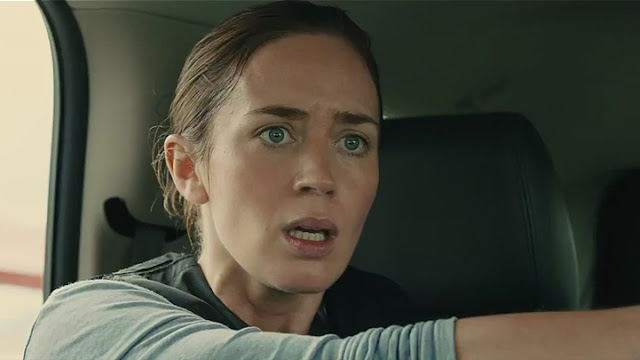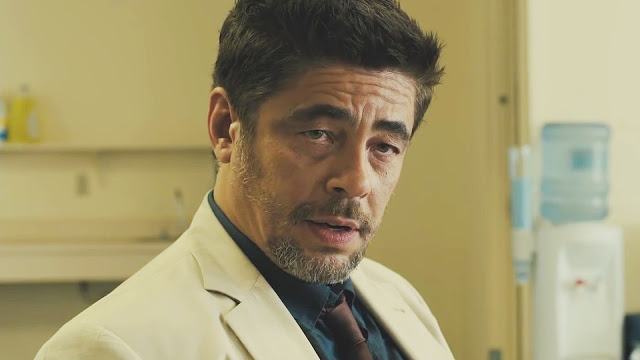For a film of such engulfing darkness, Sicario spends a surprising amount of time in broad daylight. In a different story, its frequent aerial shots of the Southwest’s rolling hills and dusty deserts might feel enchanting rather than foreboding. Yet right from its electric opening sequence—a daytime FBI raid in suburban Phoenix on a cartel stash house, the kind where all the residents pack shotguns, and cadavers line the walls like asbestos—Sicario turns that pervasive sunlight into a mirage. A vicious, lacerating depiction of the Mexican-American drug trade, the movie slowly and systematically snuffs out the slightest flicker of hope. They say drug use is a victimless crime, but in this arid land, narcotics distribution is a literal cutthroat industry, a ceaseless cycle of violence, corruption, and death.
Sounds fun, right? You’d be surprised. Yes, as a political think piece, Sicario is powerful, persuasive, and even enraging. But what makes it a great movie—something more than just a forcefully conceived polemic—is that it is also crackerjack crime fiction. Directed by Denis Villeneuve from a script by Taylor Sheridan, Sicario is a pulse-pounding piece of prime-cut entertainment, one that thrills just as much as it chills. It is both literally and metaphorically explosive, and while its suffocating bleakness may get you down, its taut plotting and bracing technique will knock you out.
Our point of entry into this dark and dazzling world—as well as the one person we meet who still clings to a glimmer of humanity—is FBI agent Kate Macer (Emily Blunt, continuing her appealingly rugged, no-nonsense phase that began with Looper and progressed spectacularly in Edge of Tomorrow). She’s the leader of the SWAT team during that aforementioned raid, which begins with a battering ram blasting through a door, escalates with some automatic-weapons fire, and ends with a big bang. It’s a quick and brutal sequence, one that sets the tone for the extreme and efficient bloodshed to come. After Kate picks herself up off the dirt, she finds herself assigned to an elite task force led by Matt Graver (Josh Brolin, supremely amoral), a Department of Defense liaison (so he says) who likes guns and hates lawyers. Their objective? “To dramatically overreact.”
That glib remark raises Kate’s eyebrows, but those dead bodies are still lingering in her mind’s eye, so she swallows her suspicion and tags along with Graver, first to El Paso, then into the lion’s den that is Juarez. Along the way they collect Alejandro (Benicio Del Toro, giving his best performance since Traffic), an enigmatic “advisor” with a curt tongue and flinty eyes. First seen gliding into a private jet in a bespoke tan suit, then shuddering during a nightmare, Alejandro has his secrets, along with the faint aura of a tragic past. But if you think he’s troubled, wait till you see what he has in store for the rest of us.
You’ll be waiting awhile. One of the strangest and most tantalizing things about Sicario is its patience, as well as its stinginess with exposition. Villeneuve carries his cards close to his chest, which means he refuses to hold your hand, a refreshingly confident approach that has the added benefit of bringing you inside Kate’s strained headspace. She may have skills in the field—Blunt invests her with a supple physicality that is palpable but also vulnerable—but she’s a naïf in the intelligence domain, and she is constantly playing catch-up. That’s why, unlike your typical heroic superagent, Kate spends most of the movie in a state of frustrated impotence, angrily asking questions rather than meting out frontier justice. Why is she here? Whom does Alejandro work for? Where are they going? What are they doing?
Villeneuve isn’t inclined to share, and neither is Graver, who only tosses the occasional crumb of information Kate’s way to sate her appetite and keep her in the fold. This means that, like Kate, you’re racing to keep up during the movie’s numerous set pieces, especially the first, a slow-burn drive in and out of Juarez to pick up a hooded prisoner. It’s here that Villeneuve starts strutting his stuff, carefully choreographing the potential threats to the convoy (“Two lanes left, green Civic”) while gradually building tension. It’s a sequence that recalls the masterful bombing scene in Zero Dark Thirty, though it ends not with a single boom but with a spray of bullets.
Those bullets light a fire under Kate, whose constant objections to the task force’s extralegal measures is another of Sicario‘s welcome conceits. Cinema (particularly the western) is littered with iconic antiheroes who discard procedure to catch the bad guys, so it’s gratifying to meet a cop who actually wants to do things by the book. It’s another indication that Villeneuve likes to paint in shades of grey, as is his bold, potentially alienating decision to intersperse Kate’s chaotic adventures with the mundane goings-on of Silvio (Maximiliano Hernández, Noah Emmerich’s partner on The Americans), a Juarez police officer. These scattered scenes, which typically involve little more than Silvio eating breakfast or mumbling with his soccer-playing son, are seemingly digressive, but while they lead to a major payoff, they also round out the film’s context. There is nothing special about Silvio—he’s just a regular guy caught in the crossfire—but his ordinariness is what makes his fate so powerful. And Sicario, in its willingness to depict consequences on both sides of the border, develops a point of view that is somehow at once specific and panoramic.
In either case, it’s an ugly view, or it would be, if it weren’t so damn beautiful. Working once again with the legendary cinematographer Roger Deakins (who also lensed his similarly bleak Prisoners), Villeneuve snares you in his web of human cruelty via expertly composed frames and sleek camera moves. A sudden close-quarters combat scene between Kate and an unexpected foe crackles with danger, while another riveting sequence, in which the task force invades an all-important tunnel in the dead of night, is filtered exclusively through the team’s goggles, alternating between the sickly green of night-vision and the alien crimson glow of thermal infrared. This level of superior craftsmanship extends to the film’s aural elements; the sound design is punchy but precise, while Jóhann Jóhannsson’s doomy score (a complete departure from his Oscar-nominated work on The Theory of Everything) is deeply unnerving, the booming drone augmenting the movie’s atmosphere of rumbling disquiet.
But as well-made as Sicario is, it is most notable for its air of hopelessness. Little in this movie is predictable, but there is nevertheless a miasma of inevitability surrounding it, a sense that nothing could happen any other way. There are moments of well-placed lightness—Kate’s partner (Daniel Kaluuya) chides her for her pitiful lingerie, while a scene of improvised torture receives a blast of blackly comic energy when an interrogator shoves his finger inside a recalcitrant detainee’s ear—but they feel like shouts into the void. Kate repeatedly attempts to rally in the name of decency and justice, but her brittle compassion is no match for Graver’s noxious apathy, much less Alejandro’s utter ruthlessness. (Del Toro, with his quiet ferocity, makes Alejandro the most terrifying cinematic assassin since Javier Bardem’s Anton Chigurh in No Country for Old Men.) The intensity of this despair, combined with Villeneuve’s uncompromising style, builds to a devastating conclusion, one that will cripple your faith in our government and maybe even in humanity as a whole.
“This is a land of wolves now,” a character tells Kate at one point. It isn’t a threat, or even a warning, so much as a blunt statement of fact. And in mapping the frontlines of America’s so-called drug war, Sicario recalls FX’s unappreciated series The Bridge, as well as Netflix’s Narcos, in which the word “sicario” (meaning hit man) is uttered regularly. But this smart, sensational movie is not imitating anything. It is entirely its own species: brutish, exhilarating, and uncompromising. It shows us a fictional land that feels all too real, one ruled by the pitiless forces of vengeance and greed. Kate tries her best, but her tremulous hope has no place in this stark world. The wolves have broken through the door.
Jeremy Beck is the editor-in-chief of MovieManifesto. He watches more movies and television than he probably should.



